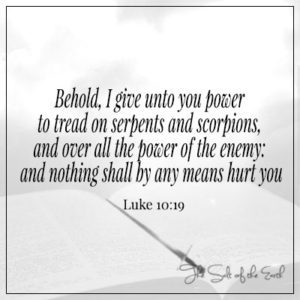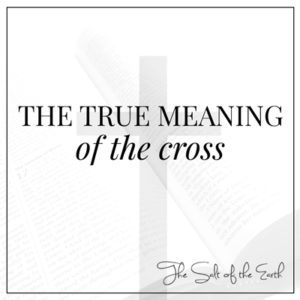And He was casting out a demon which was dumb. And it came to pass, when the demon was gone out, the dumb man spake; and the multitudes marvelled." (Luke xi. 14, R.V.m.)
It was upon this occasion that the Lord Jesus in answer to the charges of the Pharisees, said: "How can one enter into the house of the strong man...except he first bind the strong man? and then he will spoil his house." This is not the only place where the Lord plainly described a man as a "house" or habitation of the evil one. In the same chapter He speaks of the unclean spirit cast out, and, finding no other habitation, saying, "I will return into my house," and because no other had taken his place, he is able to "enter in and dwell there" with seven others more evil than himself.
The "strong man" is Satan who possesses, or works in human beings by means of his wicked spirits. Satan is as clearly a person as the Lord Jesus Christ is a Person! The Lord Jesus Christ dwells in those He redeems by His Spirit, Who imparts to them the very life of the Son of God, thus making them children of God. In the same way the prince of darkness possesses or controls the fallen race of Adam (1 John v. 19, R.V.) The Apostle says he is "the spirit that now worketh in the sons of disobedience" (Ephes. ii. 2), and the Apostle John emphatically says, "He that doeth sin is of the devil" (1 John iii. 8)—is a partaker of his nature; whilst James writes, "jealousy and faction...is earthly, natural, DEVILISH" (James iii. 14, 15 R.V.m.)
Satan is a prince—the head of an hierarchy of evil—ruling countries by means of his dignitaries (Dan. x), and entering into, or controlling, the fallen race of Adam by means of multitudes of wicked spirits. The margin of the R.V. gives the right word—demons.
We must clearly distinguish between Satan as "the spirit that now worketh in the sons of disobedience," and the actual inhabiting of men by spirits of evil. In the one it is the prince of the power of the air influencing and working in men through the lusts of the flesh, and of the thoughts, and in the other it is a wicked spirit—or it can be many (Matt. xii. 45)—entering in, and manifesting direct Satanic control of the man.
The Lord describes the strong man's attitude when in possession of the man. "FULLY ARMED" HE GUARDS HIS COURTS, and keeps his goods in peace (Luke xi. 21)! How true this is of all who are in the kingdom of darkness! Paul the Apostle describes one way in which the strong man guards his house, when he writes: "The god of this world hath blinded the thoughts of the unbelieving, that the light of the gospel should not dawn upon them" (2 Cor. iv. 4, R.V.m.)
Until we recognize the strong man "fully armed" at the back of all darkness of thought, and blindness to the Gospel, we shall not do much toward bringing men out of the power of darkness into the kingdom of God's dear Son. And until we know how to take heed to the Lord's warning and "FIRST bind the strong man," the attempts we make to "spoil his goods" will only enrage him, and enable him to strengthen his armour, and guard his palace in peace.
But there is a "STRONGER THAN HE!" The Lord says, "When a `Stronger than he shall come upon him,' then `He taketh from him his whole armour wherein he trusted, and divideth his spoils'" (Luke xi. 22).
There is no difficulty in recognizing the "Stronger than he!" The prophet Isaiah described Him as one with a face more marred than any man's—a Man of sorrows, and acquainted with grief. He depicts Him as a "lamb led to the slaughter," and says that "as a sheep before her shearers is dumb...He opened not His mouth." This One—a Lamb—would "divide the spoil with the `strong'..." (Isa. liii.) The "Stronger" than the strong man is the God Man manifested as the Lamb of Calvary. The Lord Christ was the "Stronger than he" before He went to Calvary! He cast out the spirits with His word. Unclean spirits fell down before Him, crying out, "Art Thou come hither to torment us before the time?" (Matt. viii. 29). But not until He went to Calvary's Cross did He make it possible to take away the "armour" whereby the strong man keeps his goods in peace. These "goods," in human beings held by the "strong man," consist among other things of a man's love of sin (John iii. 19); his enmity against the God Who loves him (Rom. viii. 7); the lusts of the flesh and of the mind (Ephes. ii. 3); the lust of the eyes, and the vainglory of life (1 John ii. 16).
At Calvary the Lamb laid down His life to ransom the captives of the "strong man," and through death bring to nought the works of the devil (Heb. ii. 14). He carried the sins of the sinner—the "goods"—and the sinner himself, to the Cross, so as to take away the "armour" wherein the strong man trusted. On the Cross He provides a way whereby a man's love of sin and his enmity to the God he has rebelled against can be removed through the substitutionary death of his Redeemer. There, as he moment by moment appropriates the death of Christ as the death-blow to his old man (Rom. vi. 6) the desires of the flesh and of the mind are experimentally crucified, and the love of the world, with the vainglory of earth, swept away. Yea, in His own Person the Saviour carried the sinner to the Cross with Him (Rom. vi. 6), redeeming the captive from the "strong man" and taking the "goods" out of the strong man's power!
All who thus know the way of victory through the Cross are then sent forth by the Conquering Lord to deliver other captives from their bonds; to "BIND the strong man," and then "spoil his goods"! Breathing into them the very same Spirit of the Lamb which led Him to Calvary, He says: "Behold I send you forth as lambs...I have given you AUTHORITY TO TREAD upon serpents, and scorpions, and over all the power of the enemy; and nothing shall in any wise hurt you" (Luke x. 3, 19).
Servant of the King, thou art sent forth by the Deliverer to do His works! (John xiv. 12). He bids you do what He did! "First bind the strong man" ere you point the captives to Calvary, where the strong man's armour wherein he trusts shall be taken from him.
But how? We must first see that the "strong man" has no "armour" covering us wherein he may trust, and for this we need to lay hold of the utmost deliverance from sin and Satan which the Lord wrought out on Calvary for us. Crucified with Christ we have died to sin (See Rom. vi. 1 to 13 for the fullest light on this.)—for sin is the strongest armour wherein the strong man trusts, for all sin is of the devil. "How can Satan cast out Satan?" (Mark iii. 23) said the Lord. If Satan has any hold of you, servant of Christ, you cannot deliver others from his power. Crucified with Christ we have died to sin, and died to the world lying in the evil one (1 John v. 19). But this blessed fact of faith needs carrying out in the keenest practice by constant action of the will in refusing to "let sin reign" in our "mortal bodies." To tamper with sin of any kind will quench the power of the Holy Spirit in us, by which alone we can "bind" the operations of the "strong man" around us. The believer must, therefore, make an entire cleavage with sin on the ground of Calvary (Rom. vi. 6-11), and set his choice to serve God at all costs.
As we account ourselves crucified with Christ, and constantly refuse to let sin reign, the whole armour wherein the strong man trusts is withdrawn from him. The all-conquering life of the Risen Lord can then enable us to triumph over the Adversary. Joined to Him in spirit, we are brought into vital union with the
One of the (false) doctrines that is taught in many churches, is the doctrine of binding in loosing. This doctrine of ‘binding and loosing’ is already discussed in the blogpost ‘What did Jesus mean by binding and loosing?’. However, a part of the doctrine of binding and loosing is not discussed and that’s the part of binding the strong man before spoiling his goods. It is taught, that you first have to find out, who the strong man is in a person’s life and when you’ve found out, through means of prayer, fastingand the leading of the Holy Spirit, you must bind the strong man and then you can spoil his goods by setting the person free from demonic powers. But where do we read about this doctrine in the Bible that you have to bind the strong man? Where did Jesus teach His disciples about the hierarchical levels of demons and the levels of demonic power? Who were the strong demons and who were the weak demons? Where do we read that before Jesus sent His disciples to preach the gospel, they first had to pray and fast before they could go and enter a house? Where do we read anything about the disciples fasting in relation to cast out demons? And where do we read about the doctrine of binding the strong man, in the acts and lives of the apostles? Where did they bind the strong man? But if binding the strong man is not part of the gospel, what was Jesus referring to when Jesus spoke about binding the strong man and spoiling his goods? What does the Bible say about binding the strong man? Do you have to bind the strong man or has Jesus already bound the strong man?
God had given the enemy in the hands of His people
For the Lord hath driven out from before you great nations and strong: but as for you, no man hath been able to stand before you unto this day. One man of you shall chase a thousand: for the Lord your God, he it is that fighteth for you, as he hath promised you. Take good heed therefore unto yourselves, that ye love the Lord your God. Else if ye do in any wise go back, and cleave unto the remnant of these nations, even these that remain among you, and shall make marriages with them, and go in unto them, and they to you: Know for a certainty that the Lord your God will no more drive out any of these nations from before you; but they shall be snares and traps unto you, and scourges in your sides, and thorns in your eyes, until ye perish from off this good land which the Lord your God hath given you. And, behold, this day I am going the way of all the earth: and ye know in all your hearts and in all your souls, that not one thing hath failed of all the good things which the Lord your God spake concerning you; all are come to pass unto you, and not one thing hath failed thereof. Therefore it shall come to pass, that as all good things are come upon you, which the Lord your God promised you; so shall the Lord bring upon you all evil things, until he have destroyed you from off this good land which the Lord your God hath given you. When ye have transgressed the covenant of the Lord your God, which he commanded you, and have gone and served other gods, and bowed yourselves to them; then shall the anger of the Lord be kindled against you, and ye shall perish quickly from off the good land which he hath given unto you (Joshua 23:9-16)
In the Old Covenant, we see the relationship between God and His people. God protected His people and fought for His people as long as His people walked in the way of God.
God’s people were familiar with God’s ways, since God had made these known to His people through the law (Read also: ‘The secret of the law’)

As long as the people stayed obedient to God and walked in His commandments, the people showed their love and fear for God and acknowledged Him as the one and only true living God in the heavens and earth.
Every time that God gave permission to His people to go to battle and they had to fight against the heathen nations, God had already given the heathen nations in the hands of His people; in the power of His people.
Because before the army of Israel went to battle in the natural realm, God had already bound and overcome the strong man in the spiritual realm. The only thing they had to do was to go, fight, gain the victory, spoil their goods and divide them among the people and/or take possession of their land (Gen 14:20, Ex 18:4-10, Num 21:3-34, Jos 10:8-32; 11:8; 21:44; 24:11, Jud 1:2-4, etc.).
The heathen nations saw their victories and therefore they had a great fear, not for the Israelites, but for the God of the Israelites. Because they knew that it was their God who had fought the fight and overcome the enemy.
The proof that God had overcome the enemy
How can we be certain that it was God, Who had bound the enemy and gained the victory, and that it was not due to the warrior skills and strength of His people? Because every time, when the people of God became disobedient to Him and left Him and His commandments, and God left His people, the people lost the battle. Although they went with the same amount of soldiers or sometimes, even more, they were defeated by their enemy, and instead of being victors, they became losers.
Therefore the victory over their enemies was not their own work, but it was God’s work.
No matter how powerful and mighty the armies of the Gentiles and their god(s) were, they could not compete against God and His power.
The purpose of the coming of Jesus
The Spirit of the Lord is uponMme, because He hath anointed me to preach the gospel to the poor; He hath sent Me to heal the brokenhearted, to preach deliverance to the captives, and recovering of sight to the blind, to set at liberty them that are bruised, To preach the acceptable year of the Lord (Luke 4:18-19)
Jesus Christ; the living Word, came to the earth in the Name of God; the highest authority in heavens and on earth and brought the Kingdom of God on earth. Jesus brought the Kingdom by preaching the gospel, setting the captives free and eventually by saving mankind from the rulership of the devil and the kingdom of darkness and reconciling man back to God.
Jesus would bind the strong man, who had the power over fallen man, once and for all, by taking his armor (authority) and dividing his spoils.
Jesus walked in the Name of God and the power of the Holy Spirit
Then answered Jesus and said unto them, Verily, verily, I say unto you, The Son can do nothing of himself, but what He seeth the Father do: for what things soever He doeth, these also doeth the Son likewise. For the Father loveth the Son, and sheweth Him all things that Himself doeth: and He will shew him greater works than these, that ye may marvel (John 5:19-20)
I am come in My Father’s Name, and ye receive Me not: if another shall come in his own name, him ye will receive (John 5:43)
Then said Jesus unto them, When ye have lifted up the Son of man, then shall ye know that I am he, and that I do nothing of myself; but as my Father hath taught me, I speak these things. And he that sent me is with me: the Father hath not left me alone; for I do always those things that please him (ohJn 8:28-29)
And Jesus returned in the power of the Spirit into Galilee (Luke 4:14)
Hereafter shall the Son of man sit on the right hand of the power of God (Luke 22:69)
Jesus was born of the Seed of God and consisted of a spirit, soul and body. His spirit was not dead, like fallen man, but alive and connected with His Father
For I came down from heaven, not to do Mine own will, but the will of Him that sent Me (John 6:38)
Jesus walked by faith in obedience to His Father after His commandments, which represented His will.

As long as Jesus relied on His Father and walked and did the works in His authority and the power of the Holy Spirit, He walked after the Spirit and He stood above the ruler of the world; the devil and his kingdom.
The devil acknowledged His authority and power and therefore the devil tried everything to tempt Jesus to sin, just like he did with Adam.
Because the devil knew, that if Jesus would disobey the will of God and instead listen and obey the flesh, Jesus would walk after the flesh and would come under the power (authority) of the devil.
But Jesus was not focused on the things of this world, but on the things of the Kingdom of God. Jesus didn’t listen to- and obey the lusts and desires of the flesh, but Jesus listened to the Spirit and obeyed the words of God.
Jesus didn’t rely on His flesh and didn’t do the works out of His flesh. Jesus wasn’t led by His carnal senses and therefore He didn’t rely on what He saw, heard, and felt, but He trusted His Father and was led by what the Holy Spirit and the Father revealed to Him and told Him (Isaiah 11:1-5).
Jesus spend much time in prayer and listened to His Father and stayed loyal to the words and instructions of His Father. Therefore Jesus was not intimidated by the people and the circumstances and was not tempted to sin, but Jesus stayed faithful to the will of HIs Father.
Jesus spoke the words of His Father and did the works in His power
I can of Mine own self do nothing: as I hear, I judge: and My judgment is just; because I seek not Mine own will, but the will of the Father which hath sent Me (John 5:30)
If I do not the works of My Father, believe Me not. But if I do, though ye believe not Me, believe the works: that ye may know, and believe, that the Father is in Me, and I in Him (John 10:37-38)
Believest thou not that I am in the Father, and the Father in Me? The words that I speak unto you I speak not of Myself: but the Father that dwelleth in Me, He doeth the works. Believe Me that I am in the Father, and the Father in Me: or else believe Me for the very works’ sake (John 14:10-11)
Jesus didn’t belong to the kingdom of this world and therefore Jesus didn’t speak the words of the world and didn’t do the works of the world. Instead, Jesus spoke the words of God and relied on Him and did all the works of the Kingdom of God in God’s authority and in His power.

Jesus spoke, what His Father said and did what He had seen His Father do (Read also: ‘Did you know… The feeding of the multitudes‘)
That they all may be one; as thou, Father, art in me, and I in thee, that they also may be one in us: that the world may believe that thou hast sent me. And the glory which thou gavest me I have given them; that they may be one, even as we are one: I in them, and thou in me, that they may be made perfect in one; and that the world may know that thou hast sent me, and hast loved them, as thou hast loved me (John 17:21-23)
God lived in Jesus and Jesus lived in the Father. Jesus trusted and obeyed His Father and walked after His will. His Father protected Him, provided His needs and listened to Him, and answered Him.
His Father gave Him everything He asked for and what He needed to represent, preach, and bring the Kingdom of God to the people and fulfill His task on earth.
That word, I say, ye know, which was published throughout all Judaea, and began from Galilee, after the baptism which John preached; How God anointed Jesus of Nazareth with the Holy Ghost and with power: who went about doing good, and healing all that were oppressed of the devil; for God was with him (Acts 10:37-38)
And so, Jesus walked in the Kingdom of God on earth and reigned over the devil and his kingdom. Jesus called the things which were not as though they were and brought the Kingdom to God’s people by preaching the gospel, casting out demons and healing the sick.
Just like in the Old Testament God had overcome the enemy and had given the enemy into the hands of His people, God also had overcome the strong man (the enemy); He had bind the strong man and had given him in the hands of Jesus; in His power.
Raising Lazarus from the death
We read about this in the Book of John when Lazarus was raised from the dead. Before Jesus arrived at Lazarus’ grave, God had already given Jesus Christ the victory over death. Because when Jesus arrived at the grave, where Lazarus had laid for four days and He commanded Martha to take away the stone, Jesus lifted up His eyes, and said, “Father, I thank Thee that Thou hast heard Me. And I knew that Thou hearest Me always: but because of the people which stand by I said it, that they may believe that Thou hast sent Me”.
Then Jesus cried with a loud voice, “Lazarus, come forth!”. And death obeyed the words of Jesus, which He spoke in the authority of His Father and gave Lazarus back. What took place in the spiritual realm became visible in the natural realm, when Lazarus walked out of the grave (John 11:1-44)
Jesus delegated the authority of the Kingdom of God to His disciples
Then He called His twelve disciples together, and gave them power and authority over all devils, and to cure diseases. And he sent them to preach the kingdom of God, and to heal the sick (Luke 9:1-2, Matthew 10:1, Mark 3:14-15; 6:7)
Behold, I give unto you power to tread on serpents and scorpions, and over all the power of the enemy: and nothing shall by any means hurt you (Luke 10:19)
After Jesus had spent time with His disciples, Jesus called His twelve disciples and gave them power (authority) over unclean spirits and instructed them to do the same as Jesus did, namely to preach and bring the gospel of the Kingdom of God to God’s people.
Since they knew Jesus personally and had spent time with Jesus and saw His works, they knew exactly what His words meant and what they had to do.

Jesus didn’t teach them about the types of demons and the levels of demonic powers, nor did He gave them a step-by-step plan, which they had to follow to deliver a person from the oppression of the devil. He didn’t instruct His disciples to bind the strong man first.
Jesus didn’t command them either to pray and fast, before they went or that they first had to wait for a revelation of leading before they could deliver a person.
No, Jesus didn’t do that. Because otherwise, the authority, which Jesus had given His disciples would be powerless and of no effect. Because they would have relied on their flesh and would have done the works in the power of their flesh (Read also: ‘A technical faith’).
But the authority, which Jesus had given them over unclean spirits and the faith of the disciples in Jesus and the authority which He had given to them, was sufficient to fulfill the commandment of Jesus and do the works of the Kingdom.
And so the disciples, who were not yet born again, but still belonged to the generation of the old creation, went in obedience in the power (authority) of God.
By their faith in Jesus Christ and the authority, which He had given them, the disciples brought the Kingdom of God to those, who belonged to God’s people and they did the same works as their Lord and Master Jesus Christ.
Jesus was accused of casting out devils in the name of Beelzebub
But if I with the finger of God cast out devils, no doubt the kingdom of God is come upon you. When a strong man armed keepeth his palace, his goods are in peace: But when a stronger than he shall come upon him, and overcome him, he taketh from him all his armour wherein he trusted, and divideth his spoils. He that is not with Me is against Me: and he that gathereth not with Me scattereth (Luke 11:20-23)
But if I cast out devils by the Spirit of God, then the kingdom of God is come unto you. Or else how can one enter into a strong man’s house, and spoil his goods, except he first bind the strong man? and then he will spoil his house. He that is not with me is against Me; and he that gathereth not with Me scattereth abroad (Matthew 12:28-30)
And if a house be divided against itself, that house cannot stand. And if Satan rise up against himself, and be divided, he cannot stand, but hath an end. No man can enter into a strong man’s house, and spoil his goods, except he will first bind the strong man; and then he will spoil his house (Mark 3:25-27)
The people were amazed by the works of Jesus. But because they were not familiar with the Kingdom of God, they didn’t recognize Jesus; the Word of God, and the Kingdom of God, and therefore some of them accused Jesus of casting out devils in the name of Beelzebub.
But Jesus told them, that every kingdom or house that is divided against himself can’t stand. He asked them, if He cast out devils in the name of Beelzebub, in what name their sons were casting out devils.
Jesus said, that if He had cast out devils with the finger of God (by the Spirit of God), the Kingdom of God had come unto them. Because when a strong man armed keeps his palace, his goods are in peace. This was also the case before Jesus came to the earth and the devil could continue his destructive work on earth without being disturbed, by a.o. misleading the leaders of the people with his lies, causing God’s people to be led astray.
But when a stronger than he shall come upon him and overcome him, he takes from him all his armor, wherein he trusted and divides his spoil. And that’s exactly what Jesus did, when He was sent by God to the earth and walked in the Name of God and in His power.
Because of the Name of God and His power, Jesus possessed a higher authority than the devil. Jesus exposed the lies of the devil by preaching the truth of God and taught the principles of the Kingdom of God to the people. Jesus delivered those, who belonged to God’s people from the power of the enemy by calling them to repentance, putting away sin, cast out demons, and by healing the sick.
And all those, who followed Jesus would gather with Him, just like the disciples, when they were sent by Jesus and had been given power over unclean spirits and they cast them out.
Jesus walked in the authority and power of God, but would eventually bind the strong man; the devil, and take from him all his armor and disarm his power.
Jesus has bound the strong man
Yet it pleased the Lord to bruise Him; He hath put Him to grief: when Thou shalt make His soul an offering for sin, He shall see His seed, He shall prolong His days, and the pleasure of the Lord shall prosper in His hand. He shall see of the travail of His soul, and shall be satisfied: by His knowledge shall My righteous servant justify many; for He shall bear their iniquities. Therefore will I divide Him a portion with the great, and he shall divide the spoil with the strong; because He hath poured out His soul unto death: and He was numbered with the transgressors; and he bare the sin of many, and made intercession for the transgressors (Isaiah 53:10-12)
And having spoiled principalities and powers, he made a shew of them openly, triumphing over them in it (Colossians 2:15)
Jesus accomplished God’s redemptive work for (fallen) man, through His death and resurrection. Jesus had overcome the devil and had spoiled the principalities and powers of the kingdom of darkness and made a shew of them openly, triumphing over them in it. Jesus rose from the dead with the keys of hell and of death.

And so by His work, Jesus had bind the strong man by disarming him from his power (authority).
God has (temporarily) given His Kingship to His Son, until all His enemies are put under His feet (1 Corintians 15:25).
Jesus reigns, together with the sons of God and fight together against the spiritual powers, principalities, and rulers of the kingdom of darkness.
Jesus has overcome and disarmed the principalities and powers and has given them into the hands of the sons of God.
Therefore, you don’t have to look and search for the strong man in someone’s life and then apply all kinds of worldly formulas, technics and methods to bind the strong man. What a prideful thing to do!
There is only One, Who has bound the strong man and has disarmed his armour and that’s Jesus Christ!
Only through faith in Him and in His Name; His authority it is possible to spoil the goods and plunder the kingdom of darkness by saving souls and setting the captives free.
Jesus look for those in whom He can show Himself strong
All power is given unto Me in heaven and in earth. Go ye therefore, and teach all nations, baptizing them in the Name of the Father, and of the Son, and of the Holy Ghost: Teaching them to observe all things whatsoever I have commanded you: and, lo, I am with you always, even unto the end of the world. Amen (Matthew 28:18-20)
Jesus still looks at those in whom He can reveal Himself and show Himself strong and manifest His authority and power.
Therefore He looks for people, who love Him and have faith in Him and lay down their own lives and submit themselves to Him and rely on Him and obey Him and walk in His authority and power.
Because Jesus can’t use someone, who loves himself and is full of himself and walks after the flesh and therefore relies on his own wisdom, knowledge, intellect, skills, ability, and position.
Such a person walks in pride and shall not listen to the Word, let alone submit to the Word and obey the Word. But such a person shall always know it better and shall go his own way. The person shall rely on his own insights, revelations, and experiences and shall do everything according to his own philosophy, formulas, methods, and technics, which derive from the wisdom and knowledge of this world and are based upon experiences.
As the Father has sent Me, so shall I send you
At that day ye shall know that I am in My Father, and ye in Me, and I in you. He that hath My commandments, and keepeth them, he it is that loveth Me: and he that loveth Me shall be loved of My Father, and I will love him, and will manifest Myself to him (John 14: 20-21)
Then said Jesus to them again, Peace be unto you: as My Father hath sent me, even so send I you (John 10:21)

As Jesus was sent by His Father and given His Name and His Holy Spirit to Jesus, to preach and bring the Kingdom of God on earth, so Jesus has sent those, who are born again in Him and has given His Name and the Holy Spirit, to preach and bring the Kingdom on earth on earth.
As son of God, follower of Jesus Christ and citizen of the Kingdom of God, you must know His job and place and your job and place.
Many times believers mess up the tasks and places and don’t know exactly who is responsible for what. This is mainly because they lack knowledge of the Word.
Many want to take the position of Jesus Christ, but that’s impossible. He is God and He shall always remain God. And although you are seated in Him and Jesus has promised that you will do the same works as He has done and even greater works, because He went to the Father, you will never be greater than Him (John 14:12).
Jesus bound the strong man; He disarmed him from his power by His redemptive work at the cross. Therefore you don’t have to bind the strong man but you can enter His rest.
The responsibility of the Church is not to bind the strong man but to spoil his goods
The task of the Church is not to bind the strong man, but to spoil his goods and expose and destroy the works of darkness.
The Church is responsible for the souls of this age and no one else.
It is up to the Church; the believers, who are born again in Jesus Christ to plunder the kingdom of darkness and to set the captives free. Not by relying on all kinds of complicated (human) doctrines, formulas, technics, and methods, but by faith in the Name of Jesus Christ.
Only by living after His will and by walking in the authority of Jesus Christ and the power of the Holy Spirit and preaching the truth of the gospel of Jesus Christ, calling the people to repentance, casting out demons instead of ‘binding and loosing’, healing the sick, and remitting and retaining sins, they shall establish the Kingdom of God on earth.
Let therefore the Church wake up and take her position in Jesus Christ, and despite the resistance and persecution, do what Jesus has commanded to do and possess the land for King Jesus.
‘Be the salt of the earth’

No comments:
Post a Comment